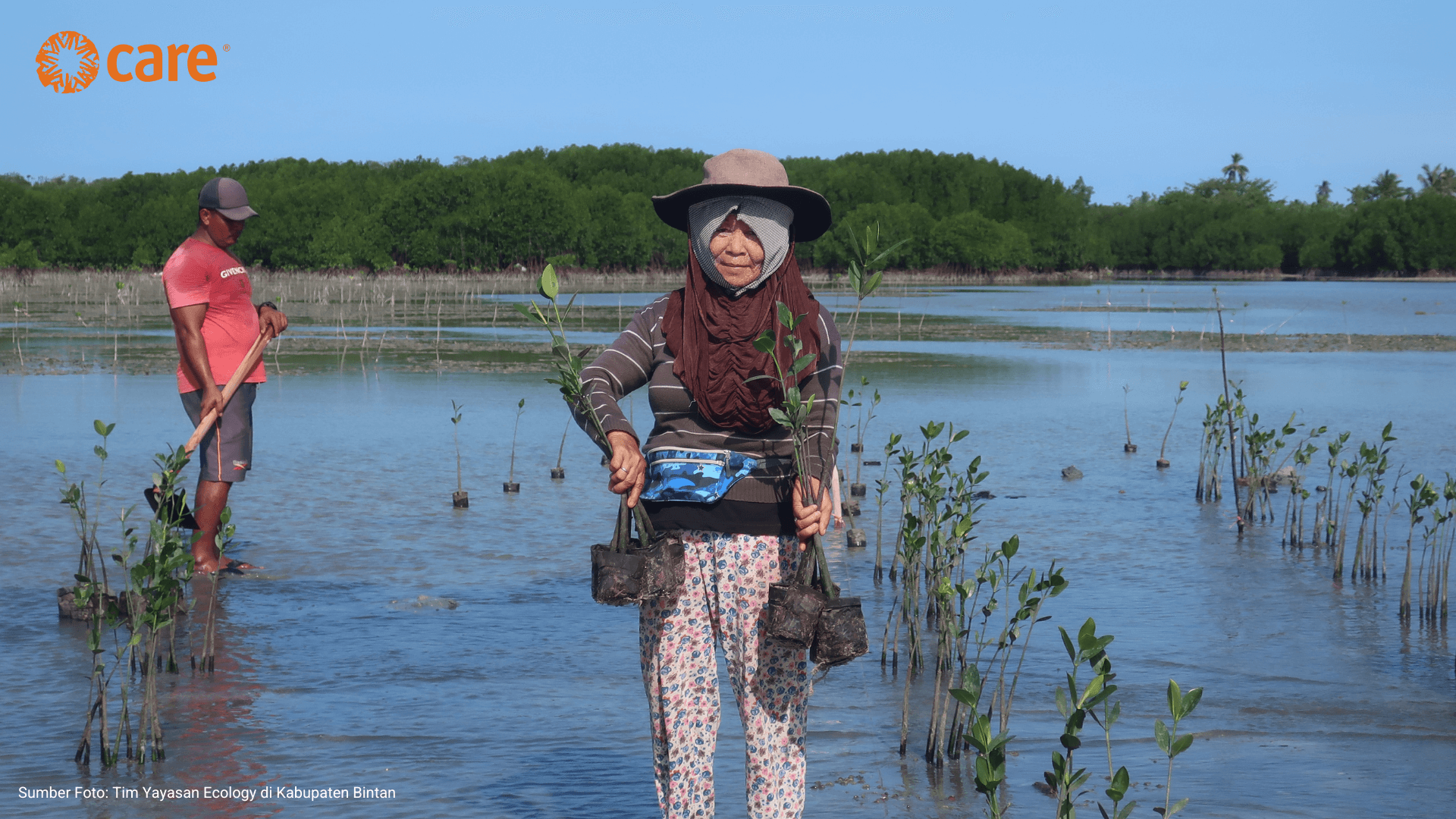Disaster Resilient Women are active drivers of flood disaster management in Jakarta.
The rooster had not yet crowed signalling dawn when Nining Kartini sent a message to the WhatsApp (WA) group on her cellphone. At the area of Rukun Warga (RW) 02 Rawa Buaya Urban Village, said Nining, “Water has already entered the residents’ houses. Right now, the water level varies from 30-50 cm. “
She sent the message at 03.04 Western Indonesian Time (WIB), February 25, 2020. At that time, the DKI Jakarta Regional Disaster Management Agency (BPBD) had not yet issued any warnings to the public regarding the flood – the sixth in 2020.
Within an hour later, Nining’s friend in the WA group, Triyanti, replied. “Hopefully the water recedes quickly and does not increase.”
“Hopefully. Residents have evacuated their motorbikes. There was already a crowd at RW 02 from 2 o’clock in the morning. When it was reported at 3 o’clock, she said the water has covered the area evenly. I just coordinated with Pak RW 02, “replied Nining while sending photos of the flood in front of and beside her house, as well as the evacuation location of residents’ motor vehicles.
The two of them are members of the WA “SinerGi-CARE” group, which consists of trainees for Disaster Resilience Women (PTB), Rawa Buaya Village Head, Kapuk Village Head, DKI Jakarta BPBD personnel, and assistants from Yayasan CARE Peduli (YCP).
Disaster Resilient Women (PTB) are women volunteers who are equipped with the capacity to be active in every stage of disaster management, namely preparedness (pre-disaster), emergency response, and recovery (post-disaster). This training is part of the Supporting Disaster Preparedness of Government and Communities (SinerGi) program implemented by YCP in two sub-districts in West Jakarta; Rawa Buaya and Kapuk. The two sub-districts were selected due to the high vulnerability to flooding in Jakarta.
YCP considers the special approach to women as important because they are a vulnerable group during disasters.
Women are often preoccupied with domestic matters, so they are usually at home when disaster strikes. Because women generally have little access to participate in community activities, they do not benefit from the socialization of information on how to deal with disasters.
PTB encourages its participants to become agents of change and play a role in leading families and communities when dealing with disasters. This training also provides opportunities for women to lead the process of disseminating information on gender equality and disaster preparedness.
There are five learning steps implemented by YCP in the PTB program. First of all, participants gain awareness about the importance of women’s roles and gender equality in disaster management. Second, YCP provides training and mentoring so that women are able and brave to speak up and share their opinions. After that, participants disseminate information about gender equality and disaster preparedness to their environment. In the next step, there is a change in relations, in which women gain the trust and recognition of their families and communities for their work. Fifth, women can be actively involved in policy negotiations and ensure gender-based needs (gender checklists) are met.
Around 30 women attended PTB training during 2019. They were selected because they were active in their communities and were relatively able to communicate well. After the training, they are expected to be able to share their knowledge with other women in their environment and manage coordination with other stakeholders such as the Neighborhood Association (RT), RW, Karang Taruna, and the Sub-district Office. They are also expected to be able to mediate the aspirations of their female friends who have not been able to participate in decision-making forums such as the Development Planning Deliberations (Musrenbang).
When the flood occurred, these resilient women proved active in the emergency response. Like Nining, they are able to collect and convey a variety of important data. Starting from the position of the water, the location of the evacuation, to the number of refugees. They are also involved in public kitchens and logistics distribution.
“PTB team, anyone ready for the public kitchen in RW 01?” said Ujang Sungkawa, Head of Kapuk Urban Village, through the WA “SinerGi-CARE” group at 9.42 WIB.
“Ready, Pak Lurah,” replied Sri Hartati, who had also completed PTB training. A number of other PTB participants also responded positively to Ujang’s questions.
Interestingly, the families of these resilient women do not mind them leaving the house and taking care of their local residents. This means that PTB participants have been able to convince families that their important role is needed by the public.
Parallel to the Disaster Resilient Women training, YCP carried out a number of other activities. Some of them are gender mainstreaming studies in disaster management documents, disability inclusion training in disaster management, and disaster simulations and evaluation of disaster contingency planning documents at the village level. YCP also conducts training on prevention of violence, harassment and sexual exploitation (PSEA) in disaster management, as well as introducing cash and voucher assistance approaches.
Empowering women, strengthening family and community resilience, and strengthening institutions that run in harmony with the SinerGi are expected to be effective in strengthening community resilience at all stages of disaster management. Thus, they can prepare themselves before a disaster, survive when it occurs, and quickly rebound afterwards.
Supporting Governments and Communities in Disaster Preparedness (Supporting Disaster Preparedness of Government and Communities / SinerGi)
Objective: Strengthen community resilience through capacity building and disaster risk or impact management
Duration: April 2019-April 2020
Location: DKI Jakarta
Number of beneficiaries as of February 2020: XXXX people
Consortium: CRS, Save the Children, Wahana Visi Indonesia
Funding support: USAID





